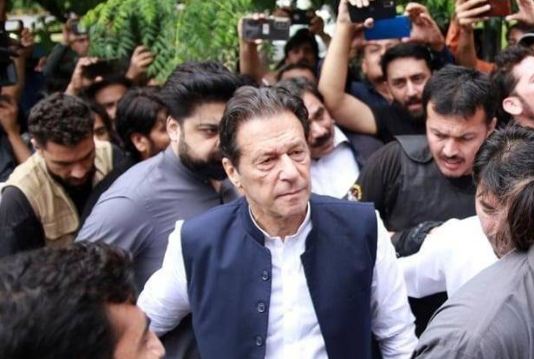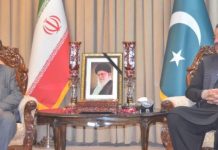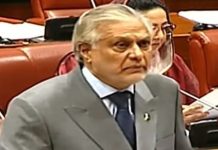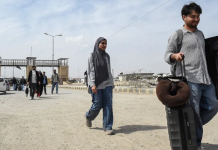“Two-member bench cannot even give you interim relief,” acting Chief Justice Sardar Tariq Masood remarks
Special Correspondent
ISLAMABAD: The Supreme Court Wednesday refused to conduct an immediate hearing of Pakistan Tehreek-e-Insaf (PTI) founder Imran Khan’s plea in the Toshakhana case.
Among other petitions, PTI also filed one seeking suspension of his conviction in the Toshakhana case to ensure he partakes in the general polls scheduled to take place on February 8 next year.
Meanwhile, sharing his remarks on the plea, Justice Athar Minallah observed that the suspension of the trial court verdict against Khan in the Toshakhana case cannot end his disqualification.
The PTI chief was disqualified for five years from holding any public office due to his conviction in the case.
The apex court, however, refused to fix the petition for hearing as only two judges of the SC were available owing to winter vacation.
On December 21, IHC’s two-member bench rejected Khan’s request seeking suspension of the trial court’s verdict in the aforementioned case.
Addressing Khan’s lawyer Shahbaz Khosa, Justice Minallah said the matter before the bench was that conviction should be overturned following suspension of sentence in the case.
“There is no judicial precedent in the country’s history that suspension of sentence led to the annulment of conviction,” he remarked.
Khosa responded by saying that there were judicial precedents when senior politician Javed Hashmi’s sentence was abolished along with the verdict.
“The court should see how Judge Humayun Dilawar issued five sentences in a single day,” the lawyer added.
Acting Chief Justice Sardar Tariq Masood told Khosa that this petition could be dismissed by a two-member bench, asking him if they should do so.
“A two-member bench cannot even give you interim relief because there is a division bench decision in the high court,” he remarked.
Justice Masood said the disqualification petition in the Toshakhana case should be fixed before a three-member bench.
“Only two judges are available in Islamabad. The Toshakhana case should be heard by at least a three-member bench,” the judge remarked.
The acting chief justice said hearing of the disqualification case is not possible this week.
“What if the case is on important points and should be heard by a five-member bench,” the acting CJP added.
“Next week, Qazi sahib will also come,” said Justice Masood referring to Chief Justice Qazi Faez Isa, who is on winter vacation.
Khosa said the court can still form a bench by summoning judges.
“The judges are not available here, you tell me who should sit and hear?” the acting chief justice asked the lawyer, after which the judges left the courtroom.
Earlier, the SC indicated fixing another PTI’s petition seeking contempt of court proceedings against the Election Commission of Pakistan (ECP) as the acting chief justice said he would decide about the matter in his chamber.
In August, Khan was sentenced to three years in prison and a fine of Rs100,000 by Additional District and Sessions Judge (ADSJ) Humayun Dilawar on August 5, 2023, after the judge found Khan guilty of graft in the Toshakhana case.
He has been convicted of misusing his position as prime minister to sell state gifts worth more than Rs140 million ($490,000) that he received from foreign dignitaries during visits abroad.
Following his conviction in the case, the Election Commission of Pakistan (ECP) disqualified the former PM for five years. In a notification, the electoral watchdog stated that the PTI chief was disqualified after being found guilty of corrupt practices under Section 167 of the Elections Act, 2017 and his sentencing for three years.
“As a consequence, Mr Imran Ahmed Khan Niazi has become disqualified under Article 63(1)(h) of the Constitution of the Islamic Republic of Pakistan read with Section 232 of the Elections Act,2017,” the notification added.
The IHC, however, on August 28, suspended the PTI supremo’s sentence awarded to him in the Toshakhana case but his conviction and disqualification remain intact as the IHC rejected the petition to suspend the conviction.

















